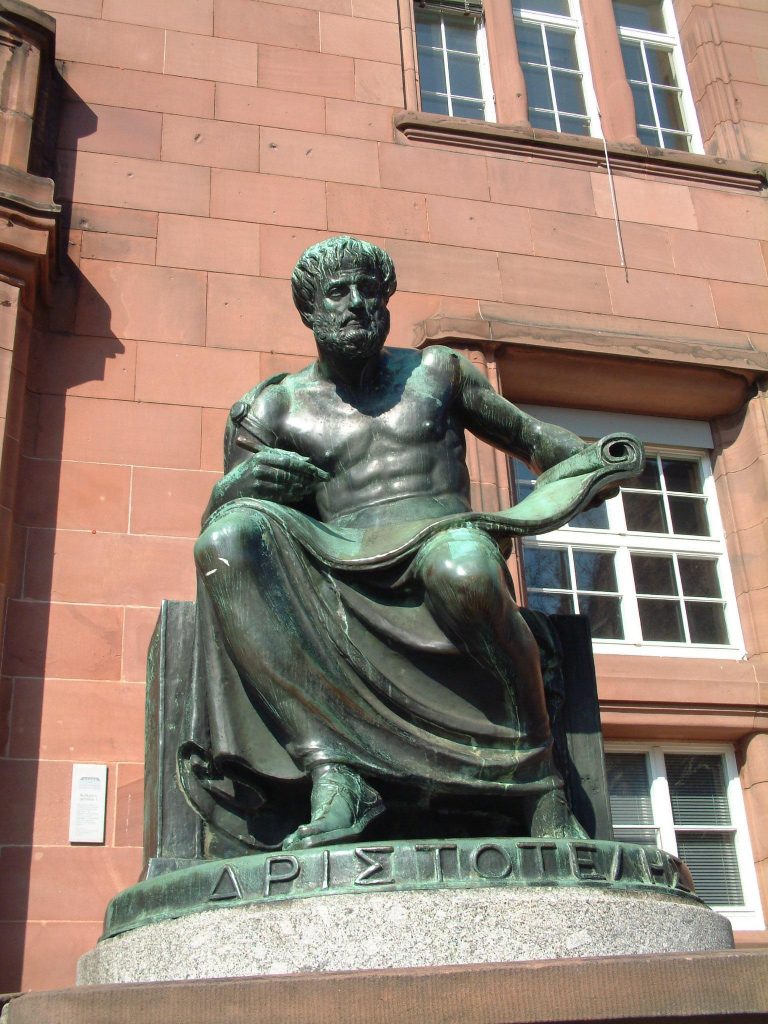Brittany Waalk

Aristotle is a name uttered by many and recognized often. Who was he? What did he accomplish? Though his name is commonly associated with philosophy, those who do not study outside of his well-known works might be unaware of how versatile and flexible the man was in various fields. Aristotle’s family traditionally served Macedonian kings as their personal physicians. Before he began his journey through philosophy and rhetoric, his father taught him biology and medicine. However, both of his parents died when he was only ten. In his teenage years, Aristotle abandoned his medical apprenticeship in favor of studying poetry and rhetoric. Under Proxenus’ guidance, a man who sought to raise Aristotle in his parents’ absence, he was sent to Athens in order to continue his studies.
What was Aristotle like? Diogenes Laertius, a Greek Historian who lived five hundred years after Aristotle, describes him as follows:
A somewhat elegant man who stood out in a crowd due to his clothing and jewelry and the way he cut his hair. He had very thin legs and spoke with a lisp. Aristotle was a kind man who was generous to his family and friends. Although he had a serious nature, he had a good sense of humor and was known to joke with his colleagues and students. (21)
As Aristotle matured, his name spread far due to him not only teaching, but also establishing himself as an author and speaking publicly about philosophy and the value of rhetorical mechanics. He wrote hundreds of books, with Rhetoric being among the most widely known.
His passion for and interest in rhetoric are conveyed through the three sections of this book, which covers the domain of rhetoric, rhetorical proofs derived from character and emotion, and matters of style and arrangement. As a professor, he explained it was beneficial for his advanced students to learn rhetoric for several reasons—while also trying to legitimize the study of it for his school. The Lyceum, founded by Aristotle himself, attracted an impressive number of scholars and aspiring sophists. Inspired by Plato’s works and dialogue, Lyceum served as a foundation of political, poetic, scientific, historical, and rhetorical studies for innovative minds. Aristotle was a firm believer in the use of logical connections to formulate answers to equations and conduct reasoning. “All men are mortal (they are born, live, and die). Socrates is a man. Thus, the logical conclusion, based on deduction, is that Socrates is mortal” is an example of a syllogism. Today, this form of thought is extremely common without most people even realizing it.
Aristotle’s vigor for biology returned when he became heavily invested in zoology. While studying animal and plant behavior over time, he eventually crafted a system of classifying animals based on their habits and characteristics. The History of Animals and On the Parts of Animals became prominent texts that could be found in the hands of rising naturalists and medics. Aside from science, he dabbled in ethics. Originally written for his youngest son, Nicomachean Ethics is the most famous of his three books on ethics. These books summarized the human condition, codes of social conduct, and numerous aspects of human existence. The end of Aristotle came after Alexander the Great’s death in 322 BCE. At the age of sixty-two, he was stricken with fever and stomach pains, which eventually claimed his life. His legacy survived through his students and family, who either sold or maintained many of his works well after his passing.
Sources
- Isle, Mick. Aristotle: Pioneering Philosopher and Founder of the Lyceum. Rosen Publishing Group, 2006.
- Kennedy, George A. A New History of Classical Rhetoric. Princeton University Press, 1995.
